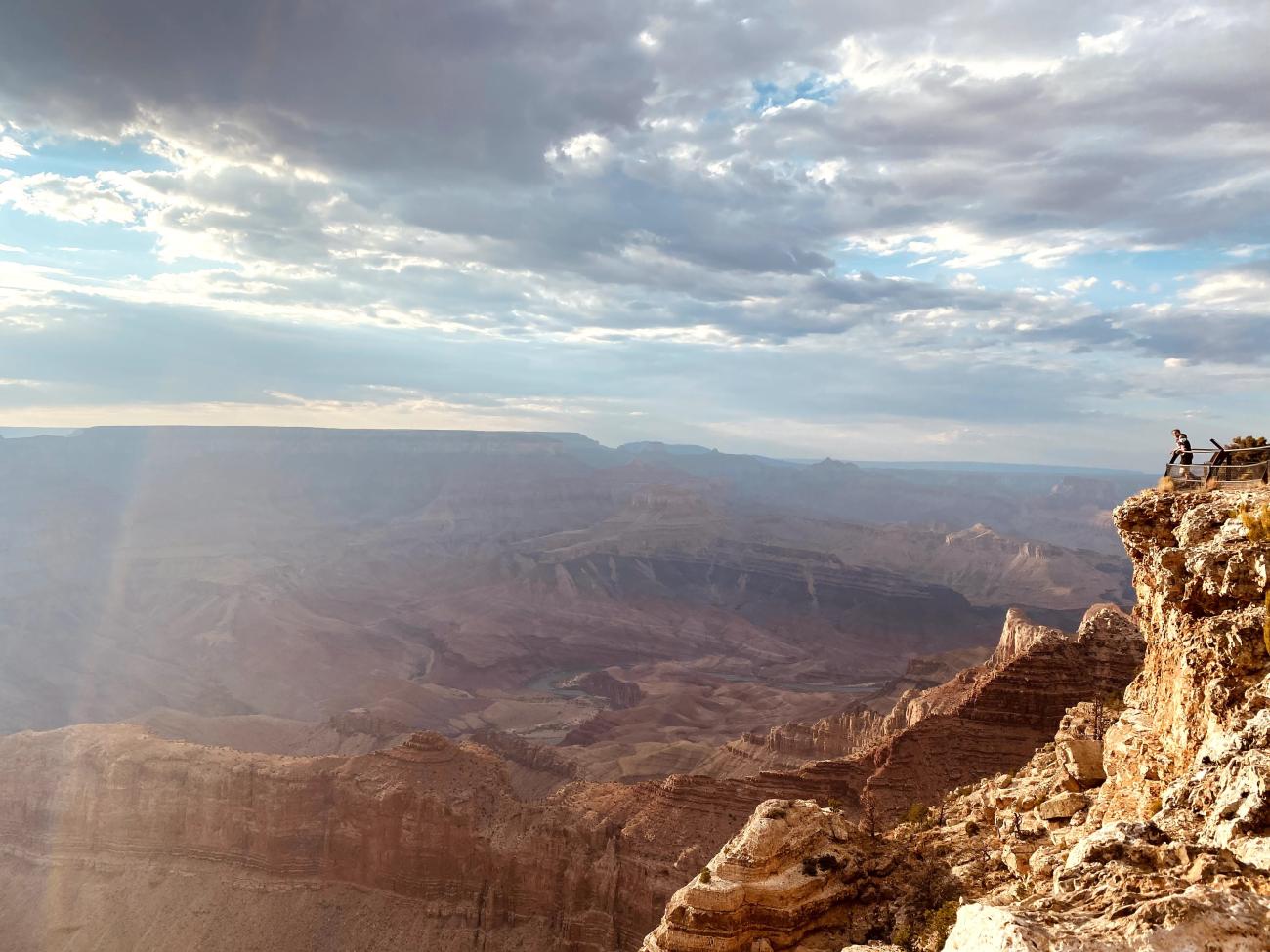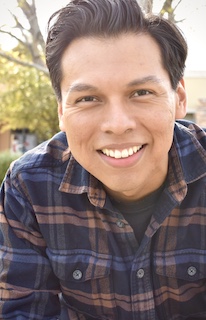
The Landscapes of Language
What is your relationship to the Native Land you're on?
A multilingual community-response piece
The community poem
The Landscapes of Language is a multilingual community poem made entirely by words and phrases submitted by participants that aims to deepen our appreciation of Indigenous lands and the language we use to call it home.
Participants described their relationship to the land using a personal experience or a feeling in any language they chose. Voices are represented in Armenian, English, French, Indonesian, Italian, Hebrew, Japanese, Latin, Spanish, and Rarámuri. The community poem was presented on April 1st at the Northern Arizona Book Festival.
The Landscapes of Language
On this land trilogy—Akimel O’odham, O’odham Jewed and Hohokam—
I chase the moon and trespass the night, question an ancient muddy river rarely there.
I sing lullabies to the water—in the faucet, in the canal, deep in the dark-depth of soil—
to keep our dreams for the future alive.
This land is dangerous, it breathes, it groans, I make peace with it. All things on this land will breathe and die.
Toujours croire en ses reves
On this land, la perla del noche brilla, and the day’s bright jewel sings.
Within the landscapes of the Hohokam land, I am humbled.
We owe our lives;
Di atas tanah Hohokam yang terbentang, aku merasa malu. Di lahan ini, kita berhutang budi.
Here, I live an ordinary life full of wonder, Here ...
Within the landscapes of the Hohokam land, I recognize myself
in the desert creatures, plants and animals, as if looking into a mirror.
On this land, I am alone, floating untethered, until I plunge my pale,
arthritic hands wrist deep into the clay-laden dirt.
carne de mi carne, sangre de mi sangre
The smell of the soil
Within the landscapes of the Nuwuvi and Nüwüwü land,
I meditate with dormant and ancient volcanoes, opening the magma chamber of our shared heartbeat.
On this land, I live hayaku, only chotto matte for a moment's rest.
Live as life goes on slowly through each second
We are all born free, as wayfarers in a void of infinity.
Mis lágrimas son arena desértica ahora Mis ojos ven palmeras
El estudiante en el desierto en medio de una lluvia de arena El desierto es cruel,
Nessa terra tem palmeiras onde canta o sabia
My land, my lake, my sky, me = land
La terra appartiene a se stessa. La abbraccio e trovo l’appartenenza.
On O'odham Jewed, deseo honrar mis hohokam y anayawari.
Within the landscapes of the Hohokham land, those who came before
made place for so many more that could become those who have gone.
old. native souls breathe. I reside
On this land, far from lights and concrete. Bajo una sabana de escombros, אמא טבע
sleeps. Labrada en el palo de un espanta helicóptero...¡Montagua!
A home is a place that has family and memories. A house
is just a building you live in. When you can't go to your house you can always go home.
Within the landscapes of Uluru Kata-Tjuta National Park, land in the Territory of Pitjantjatjara,
I weep a mother’s tear for those I never birthed.
Within the landscapes of the Hohokam land, I am engaged.
Within the landscapes of the Lehigh valley land, I am whole.
Within the landscape of this long ago Patwin land, I live with gratitude.
Je trovve les histoires de le terrain et les peuples qui me precedent
On this land: there is a magic
Within the landscapes of the Tohono O'odham land, I hear
hummingbirds whisper, "God is this very earth you were born of —
is every ephemeral stream, burst of blustery winter air, creature winged or terrestrial,
and every proud mesquite — the land itself is God."
On this land I feel "the distance from home but the presence of myself."
On this land, I feel shame and sadness though my ancestors were not the ones to steal the land.
Այս հողի վրայ որպէս սփիւռքահայ եմ ապրում
no se re muncha representacion de la gente trabajadora que me crearon
En este tierra: no somos dueños sino stewards; Freely, contemplo el splendor of Yeshua’s masterpiece;
‘ASHIRAH “Glória in excélsis Deo” In sǽcula sæculórum
On this land: we are not owners but stewards; Freely,
I contemplate the beauty of God’s masterpiece; I WILL SING “glory to God in the highest” forever and ever.
With this soil between fingers, under cracked nails,
I can begin to feel how this place could be home.
This community poem was created using submissions by the following individuals followed by the name of the Indigenous land on which they reside:
Heather J. Kirk, Akimel O’odham, O’odham Jewed, and Hohokam
Alicia Brall, Hohokam
Trillian Creath, Akimel O'odham, O'odham Jeweḍ, Hohokam
Asri Nurul Qodri, Hohokam
Boi Ngoc Thai, Akimel O’odham, O’odham Jewed, and Hohokam
Kathy McAvoy, Hohokam
Julia Nickel, Hohokam
Diana Carrillo, Tohono O’odham
Amrit Singh Johal, Akimel O’odham, O’odham Jewed, and Hohokam
Shannon Livingston-Harris, Nuwuvi (Southern Paiute), Nüwüwü (Chemehuevi)
Joshua Anthony, Hohokam
Molly Bach, Akimel O’odham, O’odham Jewed, and Hohokam
Peiyao, Akimel O’odham, O’odham Jewed, and Hohokam
Francisco Carrillo, El rancho
Luiza Mattos, Akimel O’odham, O’odham Jewed, and Hohokam
Olivia Grasso, Yavapai Apache land
Oscar Mancinas, O'odham and Piipaash
Prasanna Surakanti, Hohokham
Giannina Masias, Hohokam
Tim Allen, Kumiai
Heather J Kirk, Uluru Kata-Tjuta National Park, in the Territory of Pitjantjatjara
Chris Herman, Hohokam
Jennifer Trexler, Hohokam
Allegra Silberstein, Patwin
Elsie Loba, Tohono O'odham, Pascua Yaqui, Sobaipuri
Harsh Bhanushali, Akimel O’odham, O’odham Jewed, and Hohokam
Jennifer Gladis, Hohokam
David Vandian, O’odham Jeweḍ
Sabrina Ross, Akimel O’odham, O’odham Jewed, and Hohokam
Megan Irene Teresa Mastro, Erie
Teodora Morris, Hopitutskwa
Rita Walles, Hopitutskwa
'Explore Translation with Thousand Languages' Panel
April 1, 2023 at Liminal in Flagstaff, AZ
Translators with Thousand Languages Project, Zhongxing Zeng, Asna Nusrat, and Belén Agustina Sánchez will share personal narratives on the artistic craft of translation and their work committed to translating selections from ASU’s literary journal Hayden’s Ferry Review into myriad world languages. Join for an introduction to this exciting project celebrating translation. Presentations will include deep dives into the techniques of interlingual translation, a musical performance of language translated into song, and the results of the multilingual community poem “The Landscapes of Language” led by Chris Hoshnic.
Asna Nusrat (she/her) is a fiction writer in ASU's MFA program, translator, and non-fiction associate editor at Hayden's Ferry Review. Originally from Karachi, Pakistan, she is a bilingual writer who often dabbles in translating to or from Urdu--her Word of Home. Beyond writing and other life things, classical South Asian music, poetry and the dance form of Kathak are her major indulgences that often offer portals for alternate storytelling, in mind and Word.
Zhongxing Zeng is a Ph.D. (Literature) student in the English Department at Arizona State University. His research interests include William Blake, English Romanticism, and English-Chinese Literary Translation. He is also a singer-songwriter with publications of original music on NetEase Music, Apple Music, and Spotify under the artist name 曾寅.
Belén Agustina Sánchez comes from Buenos Aires, Argentina where she was a translator and children's and YA's literature editor. Since 2019, she has been PhD student in the Spanish Program at the School of International Letters and Cultures. She researches the connections between literature and science through the analysis of Science Fiction and Environmental Humanities. She is also finishing her certificate in Translation Studies. The most important work she’s translated to Spanish is Eduardo Kohn's book How Forest Think.
Chris Hoshnic (Organizer for "The Landscapes of Language" community poem)
Learn more about the festival by clicking here.
The Landscapes of Languages is administered by Intern Chris Hoshnic

Meet Chris
Chris Hoshnic is an Arizona State University English student and Special Projects Intern for the Thousand Languages Project. Chris has written, directed and produced three short films and one feature film. His short film OZZY, was accepted into the Jerome International Film Festival where it had its world premiere. He has also written several screenplays, two of which placed in the finals of numerous screenplay competitions.
Within the landscapes of the O’odham Jeweḍ land, shił'hadziil (I'm strong) - Language: Navajo
"Land is as sacred as it is the space we love, eat and reside on. The gifts, lessons and resources we receive from Earth are infinite. By understanding that we do not 'own' or exploit land is a greater treasure that we can carry with us.
With the above prompt, I want others to think, feel and see the sacredness of Earth itself. Through our appreciation of the land we reside on, we can move forward into a better and greater future."